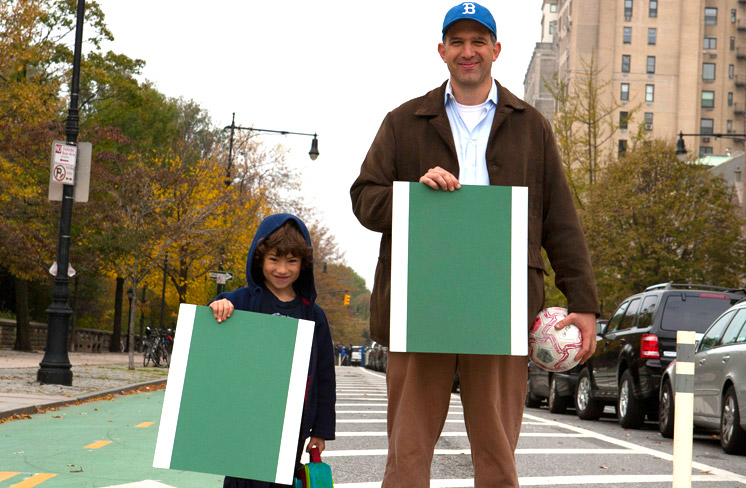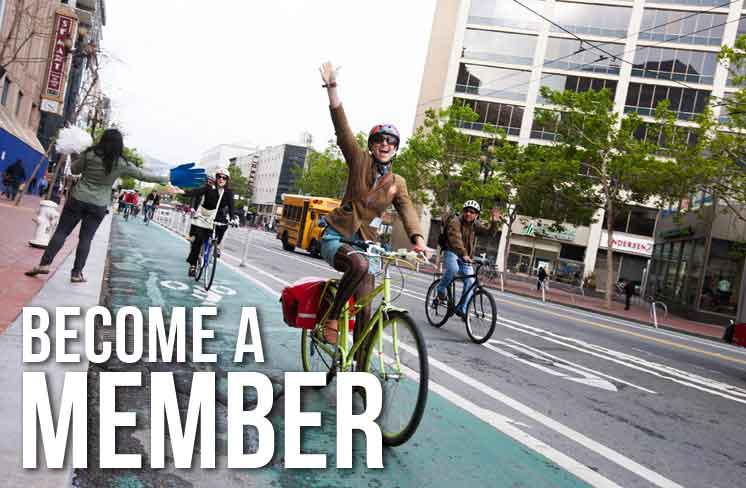We are honored to have Streetsblog founder and livable streets guru Aaron Naparstek as our 2014 Golden Wheel Awards keynote speaker. Naparstek has traveled the globe, reporting on the livable streets movement. On July 15, he’ll be in San Franicsco, sharing his stories and inspiring all of us at Golden Wheel. Here’s just a preview of his ideas on biking, safe streets and San Francisco:
With so many important issues in the world, why did you choose transportation?
Transportation chose me! After moving from Manhattan to Brooklyn in the late ‘90s, I became fascinated with the non-stop horn honking and motor vehicle mayhem on the streets outside of my apartment. Why were these beautiful neighborhood streets so dysfunctional and who was in charge of fixing them? At the time I was working as a web producer; I saw streets as yet another kind of user-interface and started thinking a lot about how they might be re-designed. I had also just discovered bike commuting. The bicycle was a revelation. Here was this remarkably fast, inexpensive, pleasurable, non-polluting form of urban transportation, and it seemed like the City did almost nothing to encourage it. I figured if I could help make New York City streets safer and better for biking I’d be satisfying my own selfish interest while also taking a small bite out of some much bigger problems – traffic congestion, air pollution, climate change, obesity, the list goes on. Transportation touches everything.
Why did you launch Streetsblog, and has it grown into what you dreamt it would be?
In the early 2000s, I started getting involved in livable streets advocacy work in Brooklyn. I ran Transportation Alternatives’ Car-Free Prospect Park campaign. We won some major victories and that work was very satisfying to me. I saw that there was incredible passion and energy around neighborhood-level transportation issues, but the press and policymakers barely paid any attention at all. I’m a journalist by training and I thought that this spectrum of issues would make a great beat to cover on an ongoing basis. This was 2004 or so; the dawn of “web 2.0” and social media. It no longer cost very much to start a new publication. So I pitched the idea for Streetsblog to Mark Gorton, an entrepreneurial financier and philanthropist (and now a good friend) who I knew was very interested in this stuff. I was about five minutes into my spiel when he was just like, “Yes, let’s do this.” Mark and I certainly thought that Streetsblog would be effective but we were both amazed at how quickly it had such a big impact.
What new projects are you working on at Harvard/MIT?
A lot of my recent work has been about training the next generation of advocates and building the livable streets movement. My most high-impact project has been StreetsPAC. Last year, I co-founded a new political action committee that supports candidates for elected office who are committed to improving the safety, mobility and livability of New York City’s streets. StreetsPAC endorsed 21 candidates in the September 2013 primary elections and 16 of them were victorious. We were instrumental in moving New York City’s new Mayor Bill de Blasio to adopt his Vision Zero program to reduce traffic-related injuries and fatalities on New York City streets. Since taking office, the City Council candidates we supported have been fantastic. StreetsPAC helped to ensure that the livable streets revolution that started under Michael Bloomberg is continuing under de Blasio. Every city should have a StreetsPAC.
What do you think are the biggest remaining obstacles toward making New York and San Francisco truly great biking cities?
The big challenge is political will. Taking street space and resources away from motor vehicles generates controversy and causes what I call “bikelash.” We need visionary political leadership that is willing to move the city forward even when that’s going to upset the status quo. This doesn’t happen on its own. The transformation we’ve seen take place in New York City in recent years is the result of four decades of grassroots advocacy. Bike advocates need to build new coalitions, get more organized and claw their way up the local political power structure. In New York City, the bike-haters sometimes like to call us “The All-Powerful Bike Lobby.” Perhaps that is exactly what we ought to aspire to be.


